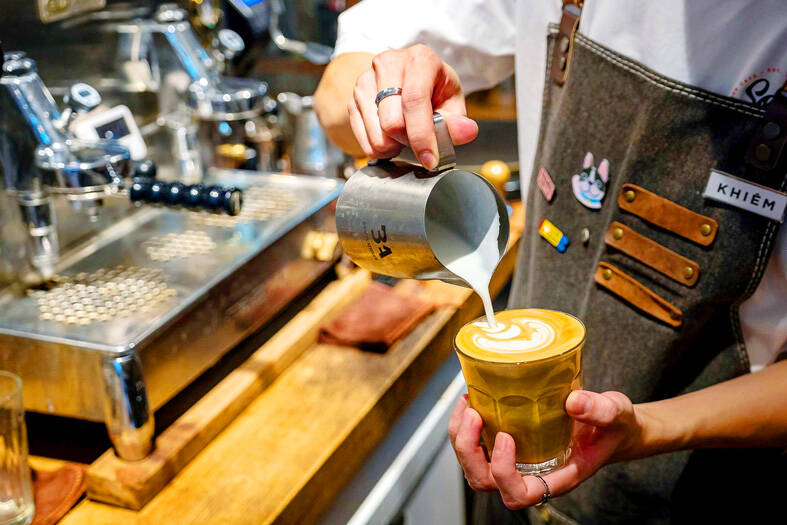Global consumption of coffee is likely to climb 1 to 2 percent a year through the end of the decade, International Coffee Organization executive director Vanusia Nogueira said, estimating that about 25 million more 60kg bags would be needed over the next eight years.
“We are more conservative now for a short-term projection,” Nogueira said at a conference in Hanoi held by the Vietnam Coffee-Cocoa Association, referring to all the events the world is facing, including high inflation in Europe and Russia’s war in Ukraine.
The organization’s earlier forecasts for consumption growth averaging 3.3 percent a year over the long term were too “optimistic,” she added.

Photo: Bloomberg
The global market would reach a balance in supply and demand in the next two or three years, from a deficit now, Nogueira said in a Bloomberg interview.
The world needs more of arabica and robusta beans, but increases in robusta production and demand would be higher, she said.
Traditional arabica producers are trying to grow more robusta amid global warming, while roasters are seeking to add cheaper robusta to their blends.
“If you have robusta with higher quality, consumers won’t feel a big difference in the blends,” Nogueira said.
Many markets are looking for fine robusta, she said.
Vietnam is doing its homework on expanding to high-quality robusta production “quite well,” Nogueira said, adding that she was surprised to taste three sets of “very good” cups of coffee during a visit a day earlier with a group of international guests to a coffee shop owned by the nation’s second-largest exporter, Vinh Hiep Co.
The group does not see Vietnam’s global dominance of robusta exports being hurt by Brazil’s increased production of conilon, because the extra output would go to supplying the South American country’s soluble industry, the world’s largest, Nogueira said.
Producing nations need to boost domestic consumption for better prices and benefits to their economies, she said.
Vietnam expects domestic coffee consumption to rise 5 to 10 percent in the coming years, from the current 300,000 tonnes, which includes 170,000 tonnes used for instant coffee production, Do Ha Nam, vice head of the country’s coffee association, said at the conference.
Nam, who is also chairman of the nation’s top shipper Intimex Group, projected that shipments from Vietnam would drop this year and next year because of lower production and insignificant carry-over stocks from the previous season.

Sweeping policy changes under US Secretary of Health and Human Services Robert F. Kennedy Jr are having a chilling effect on vaccine makers as anti-vaccine rhetoric has turned into concrete changes in inoculation schedules and recommendations, investors and executives said. The administration of US President Donald Trump has in the past year upended vaccine recommendations, with the country last month ending its longstanding guidance that all children receive inoculations against flu, hepatitis A and other diseases. The unprecedented changes have led to diminished vaccine usage, hurt the investment case for some biotechs, and created a drag that would likely dent revenues and

Macronix International Co (旺宏), the world’s biggest NOR flash memory supplier, yesterday said it would spend NT$22 billion (US$699.1 million) on capacity expansion this year to increase its production of mid-to-low-density memory chips as the world’s major memorychip suppliers are phasing out the market. The company said its planned capital expenditures are about 11 times higher than the NT$1.8 billion it spent on new facilities and equipment last year. A majority of this year’s outlay would be allocated to step up capacity of multi-level cell (MLC) NAND flash memory chips, which are used in embedded multimedia cards (eMMC), a managed

CULPRITS: Factors that affected the slip included falling global crude oil prices, wait-and-see consumer attitudes due to US tariffs and a different Lunar New Year holiday schedule Taiwan’s retail sales ended a nine-year growth streak last year, slipping 0.2 percent from a year earlier as uncertainty over US tariff policies affected demand for durable goods, data released on Friday by the Ministry of Economic Affairs showed. Last year’s retail sales totaled NT$4.84 trillion (US$153.27 billion), down about NT$9.5 billion, or 0.2 percent, from 2024. Despite the decline, the figure was still the second-highest annual sales total on record. Ministry statistics department deputy head Chen Yu-fang (陳玉芳) said sales of cars, motorcycles and related products, which accounted for 17.4 percent of total retail rales last year, fell NT$68.1 billion, or

In the wake of strong global demand for AI applications, Taiwan’s export-oriented economy accelerated with the composite index of economic indicators flashing the first “red” light in December for one year, indicating the economy is in booming mode, the National Development Council (NDC) said yesterday. Moreover, the index of leading indicators, which gauges the potential state of the economy over the next six months, also moved higher in December amid growing optimism over the outlook, the NDC said. In December, the index of economic indicators rose one point from a month earlier to 38, at the lower end of the “red” light.